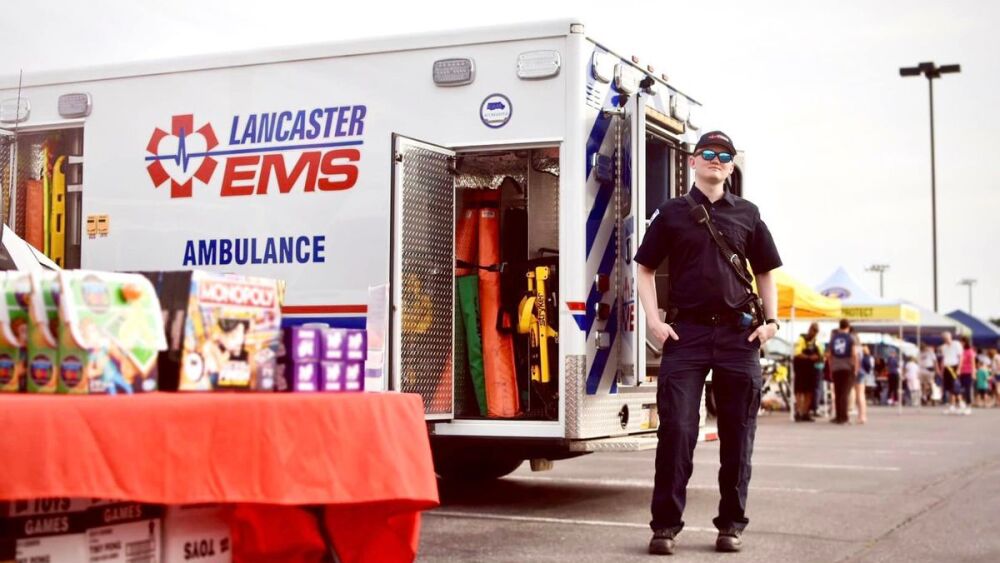By Jaxon White
LNP
HARRISBURG, Pa. — Lancaster EMS is struggling to deliver services because the state and private insurers are not compensating first responders enough, according to Executive Director Bob May. But legislation advanced in the state Senate on Wednesday could provide relief to agencies statewide.
On Wednesday, senators approved a bill to provide $20.7 million in state funds to increase the mileage reimbursement rate for ambulance services.
May said the money can’t come soon enough. Current funding pressures have left Lancaster EMS, the largest provider of emergency services in the county, struggling to offer competitive wages, making it harder to attract and hire qualified staff, May said.
“We are all right on the edge of the cliff with a couple of toes hanging over and we need a change in the model,” May said. “We’re all taking it on the chin.”
When EMS responds to a person covered by the state’s Medicaid program, May said his organization is reimbursed at a rate that covers less than the cost of responding. Currently, the base rate EMS providers receive for Medicaid enrollees ranges from $325 to around $400, depending on the severity of the service provided to the patient. They are also reimbursed $4.00 per mile for every mile they travel beyond 20 miles with a patient loaded into their vehicle.
May said every call they answer costs nearly $500.
“We need to get paid for the valuable service that we offer and all we’re asking for is to cover our costs,” May said.
The Senate previously passed legislation to boost the gas mileage reimbursement rate in June, but the bill was voted down by the House Appropriations Committee.
Heather Sharar, executive director of the Ambulance Association of Pennsylvania, shared a list of other policies her organization want lawmakers to implement, including a base reimbursement rate tied to the cost of inflation.
“EMS is struggling and we are dying and we need the increase in the reimbursement. We also need sustainable funding,” she said.
The bill passed Wednesday is part of a broader array of code bills that must be passed before the state can spend on certain programs. If passed by the House, the same bill would approve programs such as a free lunch programs for students, funding for new state police cadets and funds to cover the cost of public defenders.
The bill passed the Senate 29-18, with all Republicans and one Democrat, Sen. Lisa Boscola of Lehigh and Montgomery counties, supporting it.
But several Democrats voiced their opposition to the overall code bill because it lacks approval for several programs they’ve sought, such as a stipend program for student teachers and permanent funding for the state Whole Home Repairs Program.
“We’re not there yet. We’re not done yet,” said Senate Democratic Leader Jay Costa, of Allegheny County. “But I think at the end of the day, this is only a part of the process that doesn’t even complete this piece of the piecemeal process.”
The code bill must be approved by the Democrat-led House before it can reach Democratic Gov. Josh Shapiro’s desk for approval.
Money for hospitals
Last week, Senate Pro Tempore Kim Ward, R-Westmoreland County, said the chamber would focus on bills to initiate the emergency medical service and hospital relief funding, which would receive $50 million in emergency relief funding for hospitals if the Senate bill passes.
The association representing health systems in the state celebrated the emergency funds passed Wednesday.
"(The Hospital and Healthsystems Association of Pennsylvania) appreciates the General Assembly’s recognition of the need to stabilize hospital care in many Pennsylvania communities through a DCED program to support financially distressed hospitals,” said Liam Migdail, a spokesperson for HAP. “Pennsylvania hospitals face severe financial strain coming out of the pandemic as the skyrocketing cost of providing care has outpaced payments. During fiscal year 2022, 39 percent of the commonwealth’s hospitals operated at a loss and another 13 percent had operating margins so narrow as to not be sustainable for the long term.”
(c)2023 LNP (Lancaster, Pa.)
Visit LNP (Lancaster, Pa.) at lancasteronline.com
Distributed by Tribune Content Agency, LLC.
RELATED: ‘EMS is dying': Pa. EMS say $20M reimbursement increase is not enough












